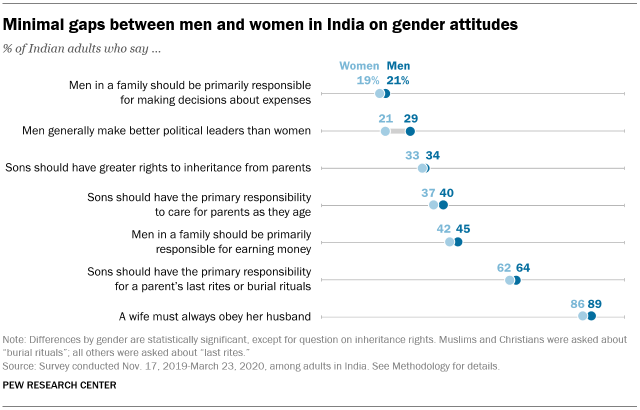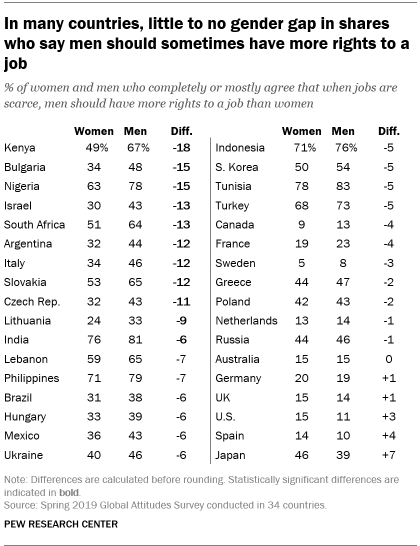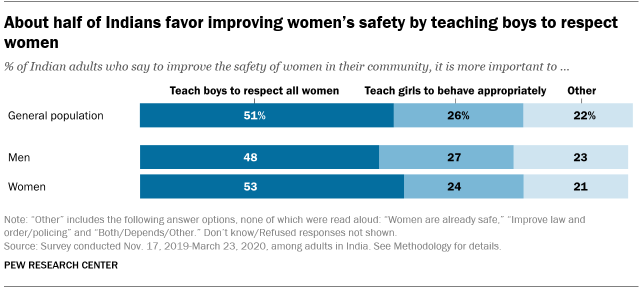Most Indians support gender equality, but a new Pew Research Center survey finds that traditional gender norms still hold sway for many people in the country. And even though traditional norms tend to give men, rather than women, more prominent roles in several aspects of family and public life, women do not differ substantially from men in their opinions on these issues.
One example is how Indians view interactions between husbands and wives. Asked if they agree with the statement that “a wife must always obey her husband,” women in India (86%) are only slightly less likely than Indian men (89%) to say they either completely or mostly agree.
Pew Research Center conducted this analysis to find out how men and women in India differ – or don’t – in their views toward gender roles. It is based primarily on the March 2022 report “How Indians View Gender Roles in Families and Society,” part of the Center’s most comprehensive, in-depth exploration of Indian public opinion to date. For this report, we surveyed 29,999 Indian adults ages 18 and older living in 26 Indian states and three union territories. Many findings from the survey in India were previously published in “Religion in India: Tolerance and Segregation,” which looked in detail at religious and national identity, religious beliefs and practices, and attitudes among religious communities. Interviews for this nationally representative survey were conducted face-to-face in 17 languages from Nov. 17, 2019, to March 23, 2020.
Respondents were selected using a probability-based sample design, and data was weighted to account for the different probabilities of selection among respondents, and to align with demographic benchmarks for the Indian adult population from the 2011 census.
We also relied on a 2019 survey of 34 countries to provide a global context for the India findings.
For more information on the India survey, read its methodology. Here are the questions used in this analysis.
Here are the questions used for the 34-nation survey, along with its methodology.
This phenomenon, where women are either as likely as or only modestly less likely than men to express traditional attitudes about gender, is not unique to India. In a different survey of 34 countries conducted by Pew Research Center in the spring and summer of 2019, only 11 countries had statistically significant differences between men and women in the shares who say that if jobs are scarce, men should have more rights to employment than women. This included India, where Indian women (76%) were only somewhat less likely than Indian men (81%) to hold this view. In other words, in most of the countries surveyed, women were about as likely as men to favor job preferences for men in times of high unemployment.
Another question on the same 34-country survey asked respondents how important it is for women to have the same rights as men in their country. In most countries surveyed, women are more likely than men to voice support for gender equality, but this pattern is far from universal. In 14 countries, including Brazil and Poland, roughly the same shares of men and women say equal rights for women are very important, and in an additional seven countries, gender gaps on this question are 10 percentage points or less. In India, women (75%) are only modestly more likely than men (70%) to support equal rights for both genders.
Gender differences also are muted when it comes to Indians’ views about relationships between children and their parents. In Indian society, sons historically have been the primary caregivers for aging parents and the main beneficiaries of inheritance. In line with these and other traditions, families have tended to place higher value on – and provide more support to – their sons than their daughters, a set of attitudes and practices known as “son preference.”
Today, while most Indian adults believe that sons and daughters should have equal responsibility to care for parents as they age, women (37%) are almost as likely as men (40%) to say it is sons who should have the primary responsibility for this. And when asked whether sons or daughters should be primarily responsible for a parent’s last rites or burial rituals, women (62%) are nearly as likely as men (64%) to say it should be sons. In addition, most Indians say sons and daughters should have equal rights to inheritance from their parents, but about a third of both women (33%) and men (34%) say that sons should have greater inheritance rights than daughters.
Against the backdrop of violence against women in India that has attracted both national and international attention, three-quarters of Indian men and women say violence against women is a “very big problem” in their country. The survey also asked respondents whether, to improve the safety of women in their community, it is more important to teach boys to respect all women or to teach girls to behave appropriately.
Around half of the Indian population – including 53% of women and 48% of men – says teaching boys to respect women is more important. But women (24%) are almost as likely as men (27%) to put the onus on women’s own behavior, saying that teaching girls to behave appropriately is the better way to improve women’s safety. Roughly a quarter of both men and women don’t take a clear position on the issue, with some saying both approaches are important, that women are already safe, or that the issue is one of law and order rather than gender norms.



